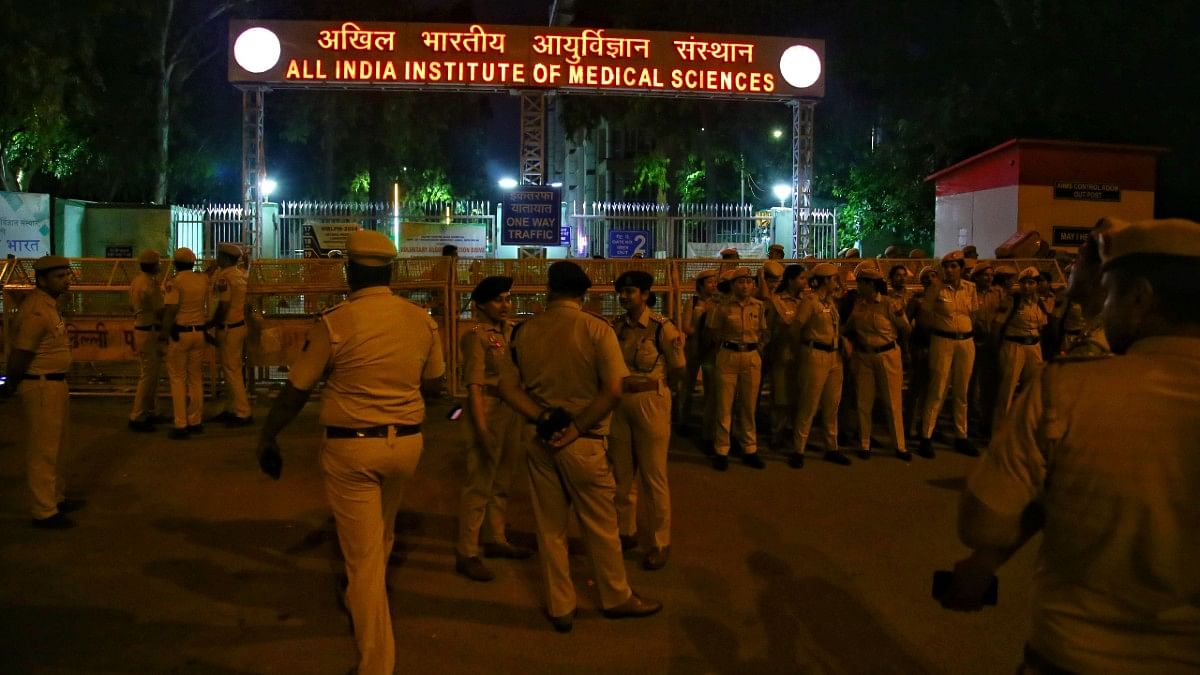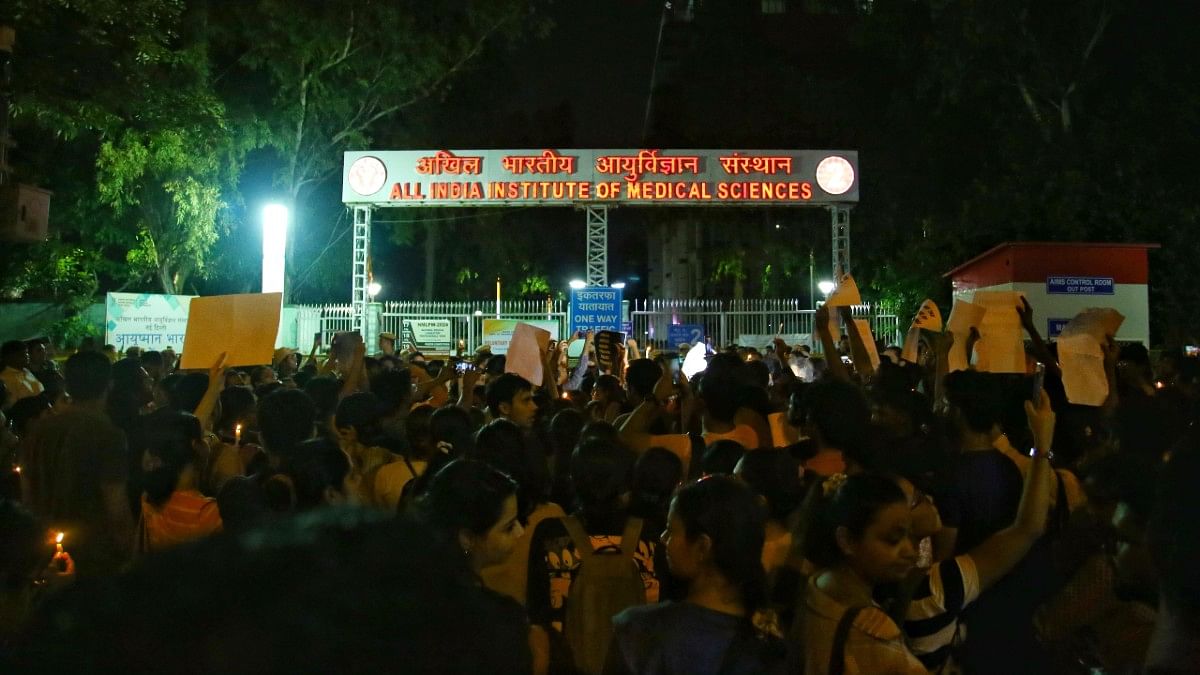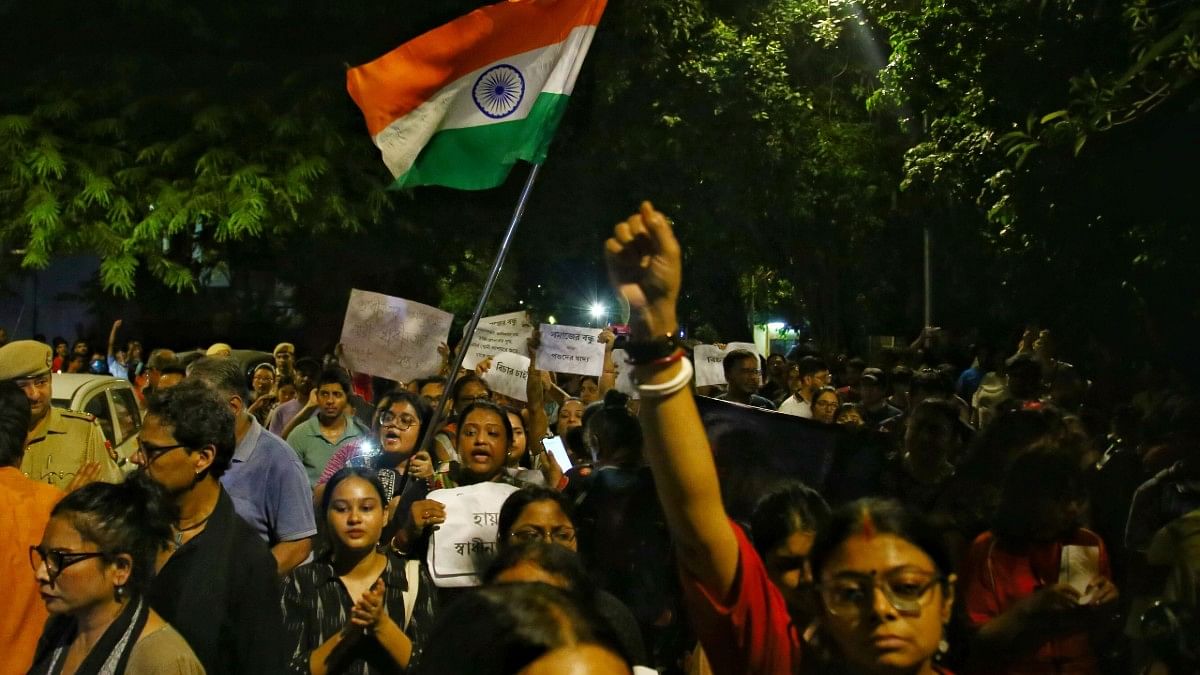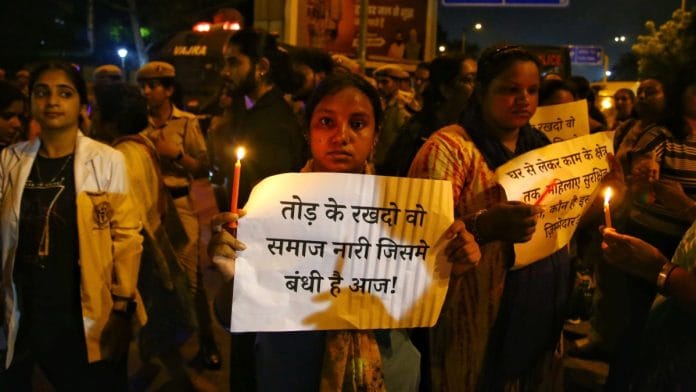New Delhi: At the stroke of the midnight hour, as the world slept, women took to the streets in multiple Indian cities to protest against the brutal rape-murder of a 31-year-old resident doctor at Kolkata’s state-run RG Kar Medical College and Hospital.
In the Capital, ‘Reclaim the Night’ protest marches were held Wednesday outside All India Institute of Medical Sciences (AIIMS) and in CR Park. Women came out in large numbers with posters and candles, raising slogans such as “todke rakhdo woh samaaj, naari jisme bandhi hai aaj” (shatter the society where a woman is shackled) and “jo haq hai daawedari hai, saari raat hamari hai” (this is our right, our claim, the night is ours).
A protest march was also held in front of the Town Hall in Bengaluru and outside RG Kar Medical College and Hospital in Kolkata, where an on-duty resident doctor’s rape and murder on 9 July led to nationwide protests by the medical fraternity.
Similar ‘Reclaim the Night’ protest marches were held across the country in the aftermath of the 2012 ‘Nirbhaya’ case.
The ‘Reclaim the Night’ movement traces its origins to the North of England where the first such march was held in Leeds in 1977 to protest against local police’s request for women to stay at home after dark in light of the murders of 13 women by a serial killer. The idea was for women to demand that they be able to move through public spaces at night. The movement has taken different shapes and forms over the years and is invoked time and again in different parts of the world to demand safe public spaces for women after dark.
‘Utopian to say women feel safe’
In Delhi, people from different walks of life gathered outside AIIMS around 11 pm. But with the institute’s gate sealed shut by police, doctors from AIIMS could not take part in the march.
“We heard doctors have been strictly warned against protesting tonight, they have even been told that they will be detained,” a student leader told ThePrint Wednesday night, adding that a few doctors did join the march, albeit without their aprons. Many others stood behind the sealed gate in scrubs to express support for those marching.
Held under a blanket of security in view of official Independence Day engagements, the protest marches outside AIIMS and in CR Park ended sometime around midnight.

Though organised by various Left-affiliated student and women outfits, including the All India Democratic Women’s Association (AIDWA) and Students’ Federation of India (SFI), the marches also saw massive citizen participation.
Sanam Hussain, a 34-year-old engineer, said it is often the seemingly ‘minor’ incidents of sexual harassment women face in universities, colleges and workspaces that lead to heinous crimes like the one in Kolkata. “There is a lack of gender sensitization in our country even though big cases like Nirbhaya and Hathras happened. Every year a case like this one happens, then we come on roads, then it happens again,” she said.
Aishe Ghosh, Delhi SFI president and former president of the JNU Students’ Union, alleged that Kolkata Police “had to accept” the demand for a postmortem under “pressure”.
“On the eve of Independence Day, what’s heartbreaking is that we had a collective imagination that we would be free… we don’t feel safe as women in this country. It would be utopian and idealistic to say that we do,” Ghosh told ThePrint.

Besides Harjit Singh Bhatti, former president of the Resident Doctors’ Association of AIIMS (Delhi), the protest march was also attended by Left leaders including Subhashini Ali, D. Raja, Mariam Dhawale and Annie Raja.
Communist Party of India (CPI) national secretary Annie Raja said the people had gathered to demand time-bound justice and to question why such incidents happen again and again despite Parliament having passed multiple laws to address the issue of women’s safety.
“The current dispensation doesn’t believe in women’s rights, equality and women claiming public space. They are anti-women. That’s why there is not even any budgetary allocation for implementation of all these acts and legislations passed by Parliament,” she contended.
She added that the government should muster “political will and social commitment” to ensure that women are seen as equal citizens. “They (women) don’t need any charity but their constitutional rights,” said Raja.
She also said that given how 94 percent of India’s women workforce is employed by the unorganised sector, “what guarantee of safety do they have when women in government hospitals are not safe?”
CPI general secretary and former Rajya Sabha MP D. Raja said while the country is observing its 78th Independence Day, “we have failed to give protection to our women”.
“We need serious introspection to understand what is the meaning of freedom if we can’t provide security to our women,” he told ThePrint.
Meanwhile, at the protest march in CR Park, women could be seen holding placards that read “The night is ours” and “She saved lives, who saved hers?”.

Mohua Ghosh, 62, said she could not stay at home after hearing about the young doctor from Kolkata. “There is no justice in our country. Such incidents have happened before also. I know the government won’t do anything about it, we are stuck. This is unfortunate.”
“Mai nikli hu uski aatma ki shanti ke liye (I have come out to pray for peace for her soul),” said Ghosh.
‘I am nothing other than a vote’
Similarly, in Bengaluru, hundreds gathered around 11.30 pm in front of the Town Hall, demanding justice for the doctor from Kolkata. “Seventy-eight years of independence, and we are still here protesting something which should have never happened in the first place. Women are not even safe in their own workspaces, what independence are people talking about,” remarked a woman doctor who did not wish to be named.
Two local ophthalmologists part of the protest march pointed to the lack of security for medical practitioners and its consequences. “A doctor gets beaten up, nobody is there to guard a doctor, there are no safeguards against such workplace hazards. This has happened so many times, our own batchmates have faced this,” said one.
Another doctor who spoke to ThePrint on condition of anonymity added, “In this country, I am nothing other than a single vote. Unless we all come together, our politicians will never take note.”
With inputs from Ashutosh Gudi in Bengaluru
(Edited by Amrtansh Arora)






